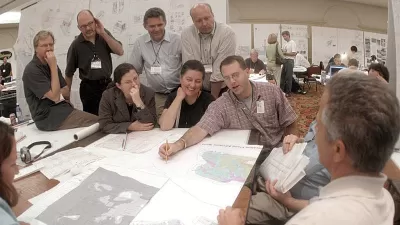World
Global issues, U.N., etc.
10 Ways Cities Are Turning Back Time
It's back to the future for global cities, now that we've realized what a mess the 20th century was.
Technology, Talent, and Tolerance: The Creative Culture
Creativity isn’t a theory about hipsters and the latte set. The key driver of a resilient economy is the same thing that binds us as humans – our shared creativity. Hazel Borys reviews Richard Florida's latest creative culture ideas.
Are Diverse Communities Discordant With Cohesive Ones?
A study utilizing simulations of more than 20 million virtual “neighborhoods” finds a negative relationship between cohesion and diversity. The findings could alter how we understand and build social capital within neighborhoods and across cities.
Why Your Solar Panels Are Likely Facing the Wrong Direction
To maximize sun exposure and electricity generation during peak times, solar panels installed in the northern hemisphere shouldn't face south, as conventional wisdom dictates, but west, finds a new study.
Six Innovative Efforts to Improve Road Safety
In honor of World Day of Remembrance for Road Traffic Victims, held yesterday, The Guardian highlighted innovative projects that are making the world's roads safer.
Injustice Becomes a Focus of Climate Negotiations
In the aftermath of Typhoon Haiyan, the unequal impacts of climate change have become a focus of discussions at an international climate conference in Warsaw. The most vulnerable (often poor) nations are demanding compensation from developed ones.
Record U.S. Oil Production, but How Long Will it Last?
A milestone was reached last month in oil imports: For the first time in 18 years, the U.S. produced more oil than it imported thanks to fracking and reduced consumption. But according to a new IEA report, shale oil growth will peak within a decade.
Visualizing the Earth's Vanishing Forests
A new study appearing in the journal Science details the devastating loss of 1.5 million million square kilometers of forest across the globe between 2000 and 2012 and presents a stunning visualization of the data using high-resolution maps.
Explaining Traffic Waves - the Likely Cause for Your Congested Commute
For many drivers, the only experience more aggravating than being stuck in traffic is not being able to figure out why there's a jam in the first place. An explanation of the phenomenon called "Traffic Waves" may help ease the aggravation.
Expanding Cycling Infrastructure Is a Snap With Lego-Like Bike Lanes
Somewhere between the universally-despised sharrow and the rare separated cycle track sits Copenhagenize Flow, a lego-like set of tiles that allows cities to experiment with expanded bike infrastructure at low cost and low commitment.
Solutionism in Urban Data Science
Shannon Mattern surveys the new wave of urban data science projects and argues that practitioners are trending toward an obsession with data-for-data’s-sake and an idolization of method.
Big Data Having Big Impact on City Operations
In the future, big data is supposed to help cities improve and optimize their operations. According to a new report that documents the innovative uses of data and evidence by seven major cities, the future is now.
The Super Typhoon and Climate Change
The head of the Philippines delegation at the United Nations Framework Convention on Climate Change in Warsaw suggests climate change is responsible for Typhoon Haiyan. Is he right? Quartz investigates the connection.
Amsterdam Will Harvest Urine for Green Roofs
As part of a campaign for International Water Week, Amsterdam's water corporation, Waternet, will use struvite from donated urine in order to fertilize the city's green roofs.
How Can We Provoke "Peak Waste"?
Because city residents generate four times as much trash as rural residents, the rapid growth of the world's cities is leading to the rapid growth of the world's garbage. A new study examines future trash troubles and potential solutions.
How a Polar Meltdown Would Reshape the Planet's Coastlines
While we won't live to see it, humanity's carbon emissions could one day melt all of the ice on Earth. National Geographic's interactive map shows how the world's coastlines would change when sea levels rise 216 feet. Say goodbye to Florida.
What's in a Neighborhood?
Tom Vanderbilt examines the word “neighborhood,” a term "frequently invoked yet seldom analyzed". He traces attempts to define, redefine, strengthen and weaken the concept in modern urbanism. Is it obsolete or more important than ever?
Top 20 Weird & Wonderful Urban Bridges
Though meant to unite, bridges can be divisive structures. What should a bridge really be? Does clever design matter, or is it all about function? Here are 20 bridges from around the world that stand out as interesting, if not always functional.

What Is Planning?
By analyzing the areas of expertise and interests of 851 undergraduate and graduate planning faculty members, Tom Sanchez investigates what planning is, what it is not, and what it could be.
Stunning Photos of Earth From Space
A collection of satellite photos reveals the planet's beauty and vulnerability from threats such as desertification, sprawl, and pollution.
Pagination
Urban Design for Planners 1: Software Tools
This six-course series explores essential urban design concepts using open source software and equips planners with the tools they need to participate fully in the urban design process.
Planning for Universal Design
Learn the tools for implementing Universal Design in planning regulations.
Heyer Gruel & Associates PA
JM Goldson LLC
Custer County Colorado
City of Camden Redevelopment Agency
City of Astoria
Transportation Research & Education Center (TREC) at Portland State University
Jefferson Parish Government
Camden Redevelopment Agency
City of Claremont


































